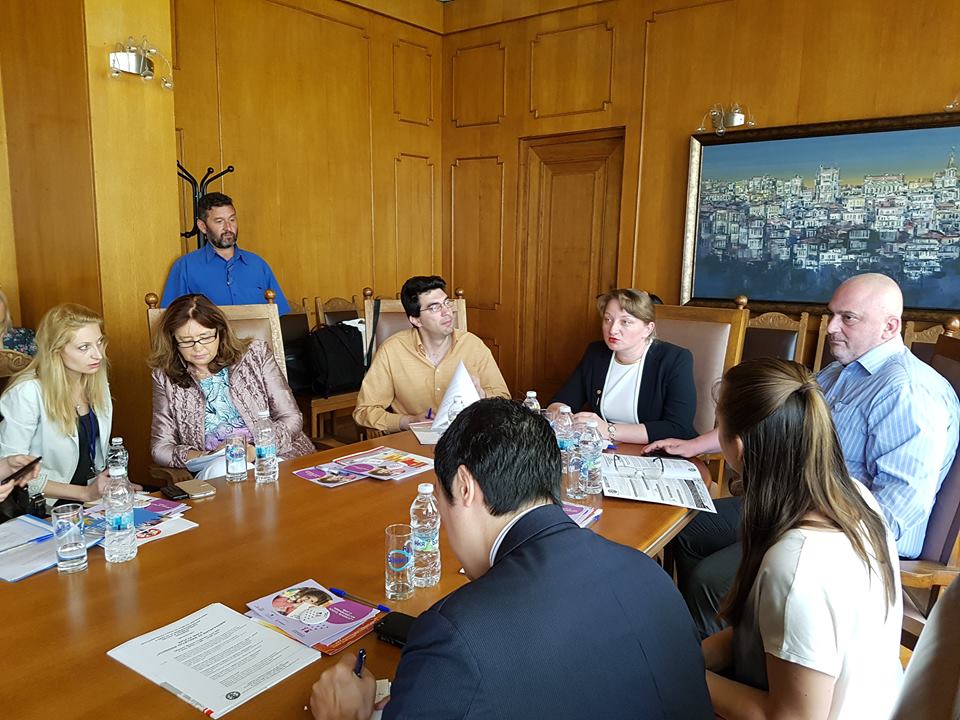09.06.2016Ambassadors, deputy ministers and NGO activists discussed models for educational integration in Veliko Turnovo
Successful models for educational integration and how they should become national policies were the main topics of discussion during the Roundtable “Successful Practices for Roma Integration”. It was organized by Center Amalipe and Roma Integration Ambassadors Group on June 4 in Veliko Turnovo as side event from the Children Roma Festival “Open Heart”. The Ambassador of Norway in Sofia H. E. Guro Katharina Vikor, Deputy Minister of Education Krassimir Kiryakov, Deputy Minister of Labor and Social Policy Denitza Sacheva, representatives of USA Embassy in Sofia, Norwegian embassies in Sofia and Bucharest, Roma NGOs, teachers from schools and kindergartens took part in the event. It was hosted in the Municipality of Veliko Turnovo.
 The enrollment of children in pre-school education from 3 to 6 years in Norway is 97 %, said in her opening remarks H. E. Guro Katharina Vikor. We ensured free kindergarten for the children of migrants in order to make them well-prepared to enter school, including to speak the national language. The Norwegian ambassador shared that Norway had bad experience with discrimination towards Roma in the past which was overcame in the last decades. We have still not managed to integrate Roma, especially the new coming ones but we are proud with our success to integrate Sami people. In Bulgaria and Romania we are supporting Roma integration through the requirement 10 % of Norwegian Financial Mechanism to be used for Roma integration initiatives. In addition, we cooperate very well with the Roma organization Amalipe and thanks to this cooperation we initiated Roma Integration Ambassadors Group. It unites ambassadors of EU countries, Switzerland, USA and Norway who want to support Bulgaria in implementing its Roma Integration Strategy, explained Mrs. Vikor.
The enrollment of children in pre-school education from 3 to 6 years in Norway is 97 %, said in her opening remarks H. E. Guro Katharina Vikor. We ensured free kindergarten for the children of migrants in order to make them well-prepared to enter school, including to speak the national language. The Norwegian ambassador shared that Norway had bad experience with discrimination towards Roma in the past which was overcame in the last decades. We have still not managed to integrate Roma, especially the new coming ones but we are proud with our success to integrate Sami people. In Bulgaria and Romania we are supporting Roma integration through the requirement 10 % of Norwegian Financial Mechanism to be used for Roma integration initiatives. In addition, we cooperate very well with the Roma organization Amalipe and thanks to this cooperation we initiated Roma Integration Ambassadors Group. It unites ambassadors of EU countries, Switzerland, USA and Norway who want to support Bulgaria in implementing its Roma Integration Strategy, explained Mrs. Vikor.
Deputy Minister of Education Kiryakov and Deputy Minister of Labor and Social Policy Sacheva addressed the participants with short explanation about the importance of cooperation with Roma NGOs. We are here to hear your experience and will stay during the entire roundtable, said the deputy ministers.
The experience of Trust for Social Achievement for raising the enrollment of Roma children in pre-school education was presented by Eugenia Volen. She explained about the program “Springboard for School Readiness” that was implemented in 240 kindergartens all over Bulgaria with the support of 20 Roma and pro-Roma organizations. Within the program kindergarten fees were paid as well as additional cash conditional transfers were done. The results were evaluated by the World Bank and will be published on June 15, explained Mrs. Volen. Nevertheless, it is even now clear that free kindergarten increases the enrollment of socially disadvantaged children significantly.
Spaska Petrova from New Road Association explained how its organization implemented “Springboard for School Readiness” program in Vratza region. She stressed that additional motivation work with Roma parents was organized at grass-root level and it was important precondition for success.
Removing the kindergarten fees is necessary for getting Roma children in pre-school education but is not enough. The other necessary precondition is the community work with Roma parents, stated Deyan Kolev. He presented the experience of LERI (Local Empowerment for Roma Integration) project in Pavlikeni that lead to almost 100 % enrollment of Roma children in obligatory pre-school groups (for 5 and 6 years old children). We paid the fees but in addition Roma community moderators worked with the parents and Parental clubs were formed to empower parents take part in the educational process. The entire presentation could be found here.
Krasimira Blagoeva, principal of Vassil Livski School in Karadjovo presented the program “Every Student Will be a Winner” that is implemented by Amalipe in 190 schools. Owing to the program we do not have any dropout since 4 years. Almost all of our students are continuing in gymnasiums, even girls from the conservative Kalajdjii group, explained Mrs. Blagoeva. Since October 2015 we have the first Roma university student from Karadjovo and I expect this year 2 more to follow his example.
Teodora Krumova and Ilko Jordanov presented the experience of Roma Health Scholarship Program. It support a cohort of Roma students in the medical universities through scholarship, mentorship and advocacy training that strengthens their Roma identity. As result of the program the number of Roma in medical universities increased 4 times. Since 2014 the program is supported by Public Health program of Norwegian Financial Mechanism in Bulgaria. Besides the implementation problems that appeared after this, RHSP should be supported within EEA / Norwegian Grants during the next period, appealed Krumova.
We will support RHSP, answered H.E. Guro Katharina Vikor. In order to avoid the implementation problems, we would like to have the program as pre-defined project. This will be our position in the negotiations with Bulgarian authorities.








